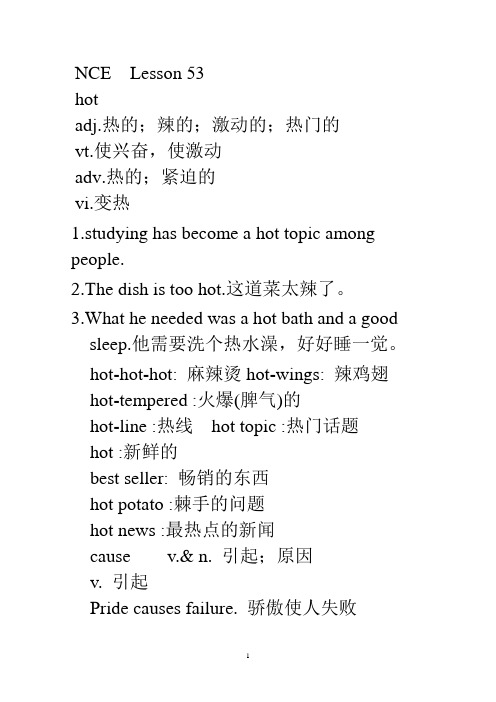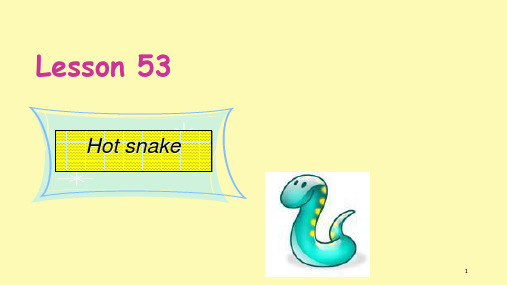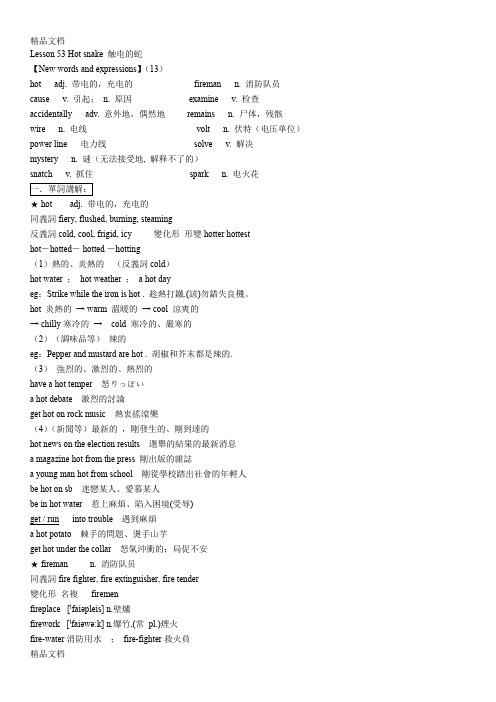新概念英语第二册逐句精讲语言点第53课(4)
- 格式:docx
- 大小:37.33 KB
- 文档页数:2

NCE Lesson 53hotadj.热的;辣的;激动的;热门的vt.使兴奋,使激动adv.热的;紧迫的vi.变热1.studying has become a hot topic among people.2.The dish is too hot.这道菜太辣了。
3.What he needed was a hot bath and a good sleep.他需要洗个热水澡,好好睡一觉。
hot-hot-hot: 麻辣烫hot-wings: 辣鸡翅hot-tempered :火爆(脾气)的hot-line :热线hot topic :热门话题hot :新鲜的best seller: 畅销的东西hot potato :棘手的问题hot news :最热点的新闻cause v.& n. 引起;原因v. 引起Pride causes failure. 骄傲使人失败cause sb. to do sth. 导致某人做某事cause by sth 由某事引起n. 原因,强调事情发生的直接原因(一个) cause sth.引起麻烦Carelessness causes accidents.Pride causes failure.cause sb to do sth. :导致某人做某事Illness caused him to lose his temper.What caused the accident?reason /cause 原因cause :强调事情发生的直接原因(一个) reason :其他各种的理由(很多个)Do you know the cause of the war?What was the cause of the delay?*examine v. 检查examine a passport examine sb. in chemistry 考某人的化学I want to examine you more closely.我想更进一步地为你检查.*accident 事故by accidentA traffic accient have an accident Accients will happen in the best regulatedfamilies. 家规再严,事端难免。


Lesson 53 Hot snake 触电的蛇【New words and expressions】(13)hot adj. 带电的,充电的fireman n. 消防队员cause v. 引起;n. 原因examine v. 检查accidentally adv. 意外地,偶然地remains n. 尸体,残骸wire n. 电线volt n. 伏特(电压单位)power line 电力线solve v. 解决mystery n. 谜(无法接受地, 解释不了的)snatch v. 抓住spark n. 电火花★ hot adj. 带电的,充电的同義詞fiery, flushed, burning, steaming反義詞cold, cool, frigid, icy 變化形形變hotter hottesthot-hotted- hotted -hotting(1)熱的、炎熱的(反義詞cold)hot water ;hot weather ;a hot dayeg:Strike while the iron is hot . 趁熱打鐵.(諺)勿錯失良機。
hot 炎熱的→ warm 溫暖的→ cool 涼爽的→ chilly寒冷的→cold 寒冷的、嚴寒的(2)(調味品等)辣的eg:Pepper and mustard are hot . 胡椒和芥末都是辣的.(3)強烈的、激烈的、熱烈的have a hot temper 怒りっぽいa hot debate 激烈的討論get hot on rock music 熱衷搖滾樂(4)(新聞等)最新的,剛發生的、剛到達的hot news on the election results 選舉的結果的最新消息a magazine hot from the press 剛出版的雜誌a young man hot from school 剛從學校踏出社會的年輕人be hot on sb 迷戀某人、愛慕某人be in hot water 惹上麻煩、陷入困境(受辱)get / run into trouble 遇到麻煩a hot potato 棘手的問題、燙手山芋get hot under the collar 怒氣沖衝的;局促不安★ fireman n. 消防队员同義詞fire fighter, fire extinguisher, fire tender變化形名複firemenfireplace [ˈfaiəpleis] n.壁爐firework [ˈfaiəwə:k] n.爆竹,(常pl.)煙火fire-water消防用水;fire-fighter救火員firehouse消防隊=fire station消防站fireproof ['faiəpru:f] adj. 耐火的, 防火的vt. 使耐火, 使防火fire-raising n. 放火、縱火★ cause v. 引起;n. 原因; 起因[C][U][(+of)]同義詞motive, reason, occasion, basis反義詞result, consequence, effect, outcome變化形名複causes 變化形動變caused caused causing(1)v. 引起、導致eg:A cigarette caused the forest fire . 香煙引起的森林大火。

lesson 53hot adj 带电的,充电的fireman n 消防队员cause v;n 引起;原因examine v 检查accidentally adv 意外地,偶然地remains n ⼫体,残骸wire n 电线volt n 伏特power line 电⼒线solve v 解决mystery n 谜snatch v 抓住spark n 电⽕花hot热的,hot-hot-hot:⿇辣烫hot-wings:辣鸡翅hot-tempered:⽕暴(脾⽓)的hot line:热线hot topic:热门话题hot cake:热蛋糕hot dog:热狗it sells like a hot cake/cakeshot新鲜的best seller:畅销的东西hot potato棘⼿的问题hot news最热点的新闻hot snake触电的蛇hydrant:消防栓fire extinguisher:灭⽕器extinguish=put out:灭⽕cause sth:引起⿇烦Carelessness causes accidents。
粗⼼导致事故Pride causes failure骄傲使⼈失败cause sb to do sthillness caused him to lose his temper because:因为 be causereason:理由,cause:原因cause:强调事情发⽣的直接原因reason:其他各种的理由examine the soilcheck:核实,核对accident-》accidental-》accidentally accident:事故unexpectedly:出乎意料地remains指dead bodysolve the mysterysolve the problemmystery(⽆法接受地,解释不了的)catch:holdsnatch:(突然抓起来)seize:抓住(⽤⼒)seize my armtextHot snakeAt last firemen have put out a big forestfire in California. Since then, they havebeen trying to find out how the fire began. Forest fire are often caused by brokenglass or by cigarette ends which peoplecarelessly throw away. Yesterday the fire-men examined the ground carefully, butwere not able to find any broken glass.They were also quite sure that a cigaretteend did not start the fire. This morning,however, a fireman accidentally dis-covered the cause. He noticed the remainsof a snake which was wound round theelectric wires of a 16,000-volt power line.In this way, he was able to solve themystery. The explanation was simple butvery unusual. A bird had snatched up the snake from the ground and then dropped it on to the wires. The snake then wound itself round the wires. When it did so, it sent sparks down to the ground and these immediately started a fire. put out a fire扑灭⽕a fire⼀场(堆)⽕since then 从那时起到现在为⽌have been trying to现在完成时强调的是很有可能broken glass被打碎的玻璃⽚cigarette ends烟头be sure that:对...很有把握quite sure:相当的把握性rather:相当fairlyquite(=completely)-》rather-》fairly程度⼀个⽐⼀个轻quite a few颇有⼏个(相当多的)start a fire=cause a fireaccidentally(by chance):偶然地unexpectedlycause:直接原因notice:注意别⼈没注意的东西wind one's way:蜿蜒⽽⾏wind:盘旋,缠绕in this way:以这种⽅式explanation:解释do so:这么做i refuse to do so我拒绝这么做send+宾补down to the groundget a electric shocknow that既然special difficultiesquiet adj 安静的quite adv 相当地,⾮常地,很cause/reasonreason:理由,cause:原因(直接)cause v1、cause sth:导致,引起2、cause sb to do sth:导致某⼈做某事reason vreason with sb:劝说(以道理)beg for sth:乞求什么东西drop/falldrop vtfall vimultiple choice6、key phrase:be able to=can,succeed in doing 11、in this way以这种⽅式like 在英⽂中不表⽰⽅式区分同位语从句与定语从句地区别:如果that做了主语或者宾语,是定语从句如果that既不作主语也不作宾语,是同位语从句。

新概念第二册Lesson 53笔记课文At last firemen have put out a big forest fire in California. Since then, they have been trying to find out how the fire began. Forest fire are often caused by broken glass or by cigarette ends which people carelessly throw away. Yesterday the firemen examined the ground carefully, but were not able to find any broken glass. They were also quite sure that a cigarette end did not start the fire. This morning, however, a fireman accidentally discovered the cause. He noticed the remains of a snake which was wound round the electric wires of a 16,000-volt power line. In this way, he was able to solve the mystery. The explanation was simple but very unusual. A bird had snatched up the snake from the ground and then dropped it on to the wires. The snake then wound itself round the wires. When it did so, it sent sparks down to the ground and these immediately started a fire.单词1 hot [hɔt] a.带电的,充电的2 fireman ['faiəmən] n.消防队员3 cause [kɔ:z] v.引起n.原因4 examine [ig'zæmin] v.检查5a ccidentally [ˌæksi'dentəli]ad.意外地,偶然地6 remains [ri'meinz] n.尸体,残骸7 wire['waiə] n.电线8 volt[vəult] n.伏特(电压单位)9 power line电力线10 solve [sɔlv] v.解决11 mystery ['mistəri] n.谜12 snatch [snætʃ] v.抓住13spark [spɑ:k] n.电火花单词讲解★hot adj.1)热的,炎热的Strike while the iron is hot. 趁热打铁hot 炎热的warm 温暖的cool 凉爽的chilly 寒冷的cold 寒冷的,严寒的2)调味品辣的辣椒和芥末是辣的.Pepper and mustard are hot.3)强烈的,激烈的,热烈的.have a hot temper 脾气暴躁a hot potato 棘手或讨厌的事物或情况★fireman=firefighter n. 消防队员hydrant [`haidrənt] n.消防栓fire extinguisher 灭火器Extinguish [ik`stiŋgwiʃ]=put out 灭火★cause1)V. 引起cause sth : 引起(麻烦)Carelessness causes accidents. 粗心导致事故Pride causes failure 骄傲使人失败cause sb to do sth引起某人做某事, 导致某人做某事2)n. 原因cause : 强调事情发生的直接原因(一个)reason : 其他各种的理由(很多个)★ examine1)v. 仔细观察,检查,调查消防队员检查了森林的每一寸土地。

Lesson 53 Hot snake【New words and expressions 】生词和短语hot adj. 带电的,充电的fireman n. 消防队员cause v. 引起; n. 原因examine v. 检查accidentally adv. 意外地,偶然地remains n. 尸体,残骸wire n. 电线volt n. 伏特(电压单位)power line 电力线solve v. 解决mystery n. 谜(无法接受地, 解释不了的)snatch v. 抓住spark n. 电火花★hot adj. 带电的, 充电的hot adj. 热的;新鲜的;棘手的;带电的, 充电的 hot-hot-hot 麻辣烫;hot-wings 辣鸡翅;hot dog 热狗 hot-tempered 火暴(脾气)的(temper n. 脾气)hot line 热线;hot topic 热门话题hot cake 热蛋糕It sells like a hot cake/cakes. 表示一个东西的畅销, 热销 best seller 畅销的东西hot potato 棘手的问题hot news 最热点的新闻★fireman n. 消防队员hydrant n. 消防栓, 消防龙头fire extinguisher 灭火器(extinguisher n. 熄灭者, 灭火器) extinguish =put out 灭火★cause v.& n. 引起;原因①v. 引起cause sth. 引起麻烦Carelessness causes accidents. 粗心导致事故Pride causes failure. 骄傲使人失败cause sb. to do sth. 引起某人做某事, 导致某人做某事Illness caused him to lose his temper. (lose one ’s temper 发火) ② n. 原因,强调事情发生的直接原因(一个)because 因为reason 理由,其他各种的理由(很多个)★examine v. 检查examine the soilcheck v. 核实, 核对★accidentally adv. 意外地, 偶然地 (但更趋向于“偶然” 的意思) accident -accidental -accidentallyaccident n. 事故unexpectedly adv. 出乎意料地(更趋向于“意外” 的意思)★remains n. 尸体, 残骸remains 指dead body★solve v. 解决solve the mysterysolve the problem★snatch v. 抓住catch v. 抓,如抓鱼hold v. 握着snatch v. (突然抓起来)强调动作的突然性seize v. 抓住(用力)seize my arm【Text 】At last firemen have put out a big forest fire in California. Since then, they have been trying to find out how the fire began. Forest fires are often caused by broken glass or by cigarette ends which people carelessly throw away. Yesterday the firemen examined the ground carefully, but were not able to find any broken glass. They were also quite sure that a cigarette end did not start the fire. This morning, however, a firemen accidentally discovered the cause. He noticed the remains of a snake which was wound round the electric wires of a 16,000-volt power line. In this way, he was able to solve the mystery. The explanation was simple but very unusual. A bird had snatched up the snake from the ground and then dropped it on to the wires. The snake then wound itself round the wires. When it did so, it sent sparks down to the ground and these immediately started a fire. 【课文讲解】 1、Hot snake hot snake 触电的蛇 get a electric shock 触电 2、At last firemen have put out a big forest fire in California. at last 最后,终于 put out a fire 扑灭火(put out 扑灭,熄灭,关掉) Please put the light/fire out. a fire 一场(堆)火 3、Since then, they have been trying to find out how the fire began. since then 从那时起,到现在为止 find out (经过研究、努力等)找出,发现,查出……(这里find out 的宾语是个从句) I ’ll try and find out the name of the person who saved my life yesterday. 4、Forest fires are often caused by broken glass or by cigarette ends which people carelessly throw away. broken glass 被打碎的玻璃片 cigarette ends 烟头 5、They were also quite sure that a cigarette end did not start the fire. be able to 能够;be not able to 没有能够 be sure that 对……很有把握;quite sure 相当的把握性 rather adv. 相当 fairly adv. 相当, 公正地, 诚实地 quite(=completely)>rather>fairly 程度一个比一个轻 quite a few 颇有几个(相当多的) start a fire =cause a fire (start vt. 使……发生,引起) 6、This morning, however, a firemen accidentally discovered the cause. accidentally =by chance 偶然地 discover 本身含有偶然发现(某个已经存在的东西)的含义 I don ’t know who discovered America. 7、He noticed the remains of a snake which was wound round the electric wires of a 16,000-volt power line. notice 注意别人没注意的东西 the remains 表示“尸体,残骸”,必须用复数形式: The villagers were surprised to see the remains of an aeroplane near the lake. 16,000-volt power line 连字符“-” 一旦加在两个词之间, 这个词之间就失去了加复数的资格,能够加连字符的概念一定是做定语。
新概念第二册Lesson 53 Hot snake一、单词精讲hot [hɔt]a.带电的,充电的引申:当“hot”表示“带电的,充电的”时,可引申为处于一种具有电能、充满电或者与电流相关的危险状态。
Be careful, that wire is hot.(小心,那根电线是带电的)这里的“hot”意味着电线带有电流,触碰可能会导致触电危险。
词源:“hot”的这个含义与它基本的“热的”含义有一定关联。
从物理角度来看,电流通过导体时会产生热量,所以“hot”被用来形容带电的、充电的这种类似会产生热量或者具有能量的状态。
搭配:hot-hot-hot : 麻辣烫hot-wings : 辣鸡翅hot-tempered : 火暴(脾气)的hot line : 热线hot topic : 热门话题hot cake : 热蛋糕hot dog : 热狗It sells like a hot cake/cakes 表示一个东西的畅销, 热销hot新鲜的best seller : 畅销的东西hot potato棘手的问题hot news最热点的新闻hot snake触电的蛇fireman ['faiəmən] n.消防队员词源:fireman”作为“消防队员”,可引申为在火灾现场进行救援、灭火、保护生命和财产安全等一系列与火灾应对相关工作的专业人员。
他们还可能参与到其他危险情况的救援中,例如在化学物质泄漏起火或者森林火灾等场景发挥关键作用。
例如,“The fireman not only put out the fire but also rescued the trapped people.”(消防队员不仅扑灭了大火,还营救了被困人员。
)引申:“fireman”由“fire”(火)和“man”(人)组成,直接表明了其与火相关的人的身份,也就是处理火灾事务的人员。
搭配:“a brave fireman”(一名勇敢的消防队员),例如:A brave fireman rushed into the burning building.(一名勇敢的消防队员冲进了着火的大楼。
Lesson 53 Hot snake 触电的蛇【New words and expressions】(13)hot adj. 带电的,充电的fireman n. 消防队员cause v. 引起;n. 原因examine v. 检查accidentally adv. 意外地,偶然地remains n. 尸体,残骸wire n. 电线volt n. 伏特(电压单位)power line 电力线solve v. 解决mystery n. 谜(无法接受地, 解释不了的)snatch v. 抓住spark n. 电火花★ hot adj. 带电的,充电的同義詞fiery, flushed, burning, steaming反義詞cold, cool, frigid, icy 變化形形變hotter hottesthot-hotted- hotted -hotting(1)熱的、炎熱的(反義詞cold)hot water ;hot weather ;a hot dayeg:Strike while the iron is hot . 趁熱打鐵.(諺)勿錯失良機。
hot 炎熱的→ warm 溫暖的→ cool 涼爽的→ chilly寒冷的→cold 寒冷的、嚴寒的(2)(調味品等)辣的eg:Pepper and mustard are hot . 胡椒和芥末都是辣的.(3)強烈的、激烈的、熱烈的have a hot temper 怒りっぽいa hot debate 激烈的討論get hot on rock music 熱衷搖滾樂(4)(新聞等)最新的,剛發生的、剛到達的hot news on the election results 選舉的結果的最新消息a magazine hot from the press 剛出版的雜誌a young man hot from school 剛從學校踏出社會的年輕人be hot on sb 迷戀某人、愛慕某人be in hot water 惹上麻煩、陷入困境(受辱)get / run into trouble 遇到麻煩a hot potato 棘手的問題、燙手山芋get hot under the collar 怒氣沖衝的;局促不安★ fireman n. 消防队员同義詞fire fighter, fire extinguisher, fire tender變化形名複firemenfireplace [ˈfaiəpleis] n.壁爐firework [ˈfaiəwə:k] n.爆竹,(常pl.)煙火fire-water消防用水;fire-fighter救火員firehouse消防隊=fire station消防站fireproof ['faiəpru:f] adj. 耐火的, 防火的vt. 使耐火, 使防火fire-raising n. 放火、縱火★ cause v. 引起;n. 原因; 起因[C][U][(+of)]同義詞motive, reason, occasion, basis反義詞result, consequence, effect, outcome變化形名複causes 變化形動變caused caused causing(1)v. 引起、導致eg:A cigarette caused the forest fire . 香煙引起的森林大火。
新概念二Lesson53知识点整理Lesson 53 Hot Snake 触电的蛇学习目标全解必记单词hot adj. 带电的,通电的fireman n. 消防队员cause v. 引起;n. 原因examine v. 检查accidentally adv. 意外地,偶然地remains n. 尸体,残骸wire n. 电线volt n. 伏特(电压单位)power line 电力线solve v. 解决mystery n. 谜snatch v. 抓住spark n. 电火花常考短语at last 最后,终于put out 扑灭,熄灭,关掉since then 从那时起,到现在为止find out 找出,发现,查出……throw away 扔掉,丢弃be sure that 对……很有把握start a fire 引起一场大火in this way 就这样snatch up sth from.... 从......抓起来cigarette ends 烟头broken glass 碎玻璃经典句型1.At last firemen have put out a big forest fire in California.2.Since then, they have been trying to find out how the firebegan.3.Forest fires are often caused by broken glass or by cigaretteends which people carelessly throw away.4.They were also quite sure that a cigarette end did not startthe fire.5.This morning, however, a firemen accidentally discoveredthe cause.6.He noticed the remains of a snake which was wound roundthe electric wires of a 16,000-volt power line.7.In this way, he was able to solve the mystery.8.The snake then wound itself round the wires.重点语法1. 复习现在完成进行时的用法:(1)定义:是从过去某一时刻开始的动作,一直持续到现在,也许还将持续下去,也许马上就要结束。
逐句精讲新概念英语第二册:第53课触电的蛇Lesson53 Hot snake新概念英语2课文内容:At last firemen have put out a big forest fire in California. Since then, they have been trying to find out how the fire began. Forest fire are often caused by broken glass or by cigarette ends which people carelessly throw away.Yesterday the firemen examined the ground carefully, but were not able to find any broken glass. They were also quite sure that a cigarette end did not start the fire. This morning, however, a fireman accidentally discovered the cause. He noticed the remains of a snake which was wound round the electric wires of a 16,000-volt power line. In this way, he was able to solve the mystery. The explanation was simple but very unusual. A bird had snatched up the snake from the ground and then dropped it on to the wires. The snake then wound itself round the wires. When it did so, it sent sparks down to the ground and these immediately started a fire..本文语法:现在完成进行时一句话总结:现在完成进行时表示过去某时开始发生,一直延续到现在并且可能继续发生下去的动作。
新概念英语第二册逐句精讲语言点第53课(4)
Lesson53 Hot snake
At last firemen have put out a big forest fire in California. Since then, they have been trying to find out how the fire began. Forest fire are often caused by broken glass or by cigarette ends which people carelessly throw away.Yesterday
the firemen examined the ground carefully, but were not able
to find any broken glass. They were also quite sure that a cigarette end did not start the fire. This morning, however,
a fireman accidentally discovered the cause. He noticed the remains of a snake which was wound round the electric wires
of a 16,000-volt power line. In this way, he was able to
solve the mystery. The explanation was simple but very unusual. A bird had snatched up the snake from the ground and then dropped it on to the wires. The snake then wound itself round the wires. When it did so, it sent sparks down to the ground and these immediately started a fire.
10、A bird had snatched up the snake from the ground and
then dropped it on to the wires.
一只鸟把蛇从地上抓起来,然后把它扔到了电线上。
…
语言点辨析drop, fell:
1) drop v.丢在,降落(主动);drop n.水珠;[复]眼药水,滴剂
2) fell v.掉下,坠落(被动);falln.秋天;瀑布(=waterfall)
11、The snake then wound itself round the wires.
于是蛇就缠住了几根电线。
语言点 then意为“然后”
12、When it did so, it sent sparks down lo the ground and these immediately started a fire.
当它这样做时,把大花送到了地面,这法火花立刻引起了一场大火
语言点 so常常用在动词后表示前句说过的一件事情或者某个动作,避免重复。